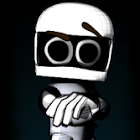I vaguely remember this sort of game play being more of a thing back in the DOS and older era of gaming. Different games like an air combat command game (That is totally slipping my mind as to a name) would put the player in a position that was more 'set back' from the action, and at a higher level command than what we see in later games.
The player ended up managing resources and directing where missions happened, but the exact details on things typically were very glossed over. Sending out missions would generally uncover more information - New SAM sites locations would appear on the map, icons for interceptions by enemy fighters would appear, but you might not know which air base they were running out of, and you never had a complete picture of everything at any one time. Entire armies were moved around on the battlefield in a highly abstracted manner, but you as the player never saw more than things like missions to take out armoured columns, or sites where mobile SAM was setup.
I think part of this being seen more decades ago is related to the computing and display power of the era, but it then fell out of favour with developers in the pursuit of flashier gameplay and more 'direct' user interaction. When you couldn't give the user control over Supreme Commander sized armies and interaction, then a more 'stepped back' style strategy game made more sense than trying to do the impossible.
In a big way the simulation games of the era where heavily influenced by table top gaming more than it is today, and many designs really have the look and feel of "Well this would be awesome to play (as an extension of some existing boardgame concept), but it is just way too much math and tedious calculating/moving of things to do... What if we had a magic box that handled that stuff for us?" aspects.
But I do agree that the idea of a high level command game that builds a slow but forceful strategy play rather than frenzied clicking 'in your face' up close action game play has a lot of appeal. Kind of a "Boxing match in slow-mo" sort of thing in a way. The hits are coming hard from either side, you have time to see them and think about how to respond, but you still need to plan well ahead of where you are now and what is going on or you'll never be in position to land the series of blows you need to take out your opponent.















